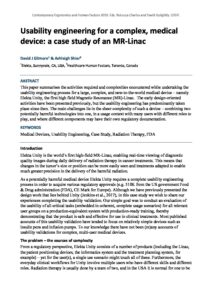Elekta Unity is the world’s first high-field MR-Linac, enabling real-time viewing of diagnostic quality images during daily delivery of radiation therapy in cancer treatments. This means that changes in the tumor’s size or position can be more easily seen and treatments adapted to enable much greater precision in the delivery of the harmful radiation.
As a potentially harmful medical device Elekta Unity requires a complete usability engineering process in order to acquire various regulatory approvals (e.g. 510K from the US government Food & Drug administration (FDA), CE Mark for Europe). Although we have previously presented the design work that lies behind Unity (Jenkins et al., 2017), in this case study we wish to share our experiences completing the usability validation. Our simple goal was to conduct an evaluation of the usability of all critical tasks (embedded in coherent, complete usage scenarios) for all relevant user groups on a production-equivalent system with production-ready training, thereby demonstrating that the product is safe and effective for use in clinical treatments. Most published accounts of this usability validation have tended to focus on relatively simple devices such as insulin pens and infusion pumps. To our knowledge there have not been (m)any accounts of usability validations for complex, multi-user medical devices.
Elekta Unity is the world’s first high-field MR-Linac, enabling real-time viewing of diagnostic quality images during daily delivery of radiation therapy in cancer treatments. This means that changes in the tumor’s size or position can be more easily seen and treatments adapted to enable much greater precision in the delivery of the harmful radiation.
As a potentially harmful medical device Elekta Unity requires a complete usability engineering process in order to acquire various regulatory approvals (e.g. 510K from the US government Food & Drug administration (FDA), CE Mark for Europe). Although we have previously presented the design work that lies behind Unity (Jenkins et al., 2017), in this case study we wish to share our experiences completing the usability validation. Our simple goal was to conduct an evaluation of the usability of all critical tasks (embedded in coherent, complete usage scenarios) for all relevant user groups on a production-equivalent system with production-ready training, thereby demonstrating that the product is safe and effective for use in clinical treatments. Most published accounts of this usability validation have tended to focus on relatively simple devices such as insulin pens and infusion pumps. To our knowledge there have not been (m)any accounts of usability validations for complex, multi-user medical devices.
